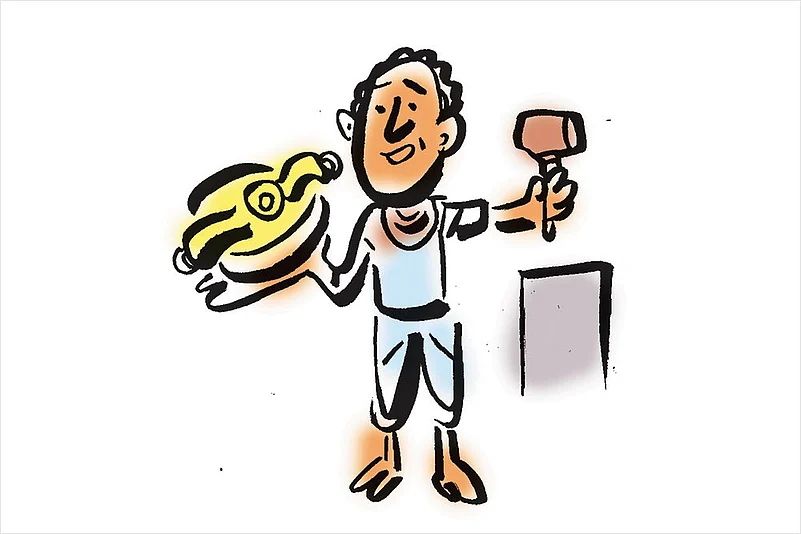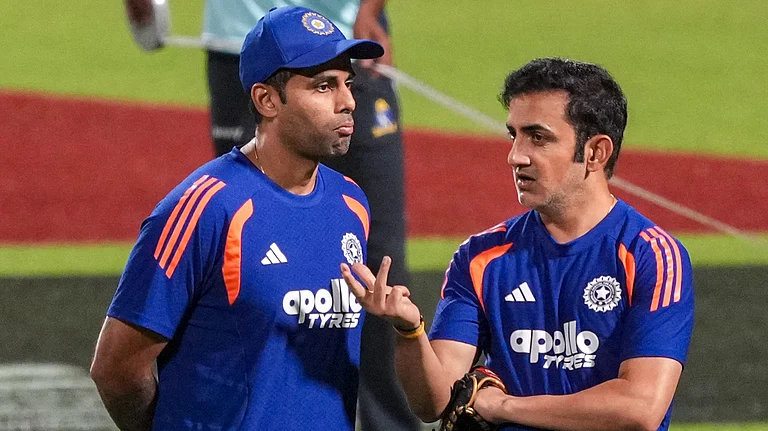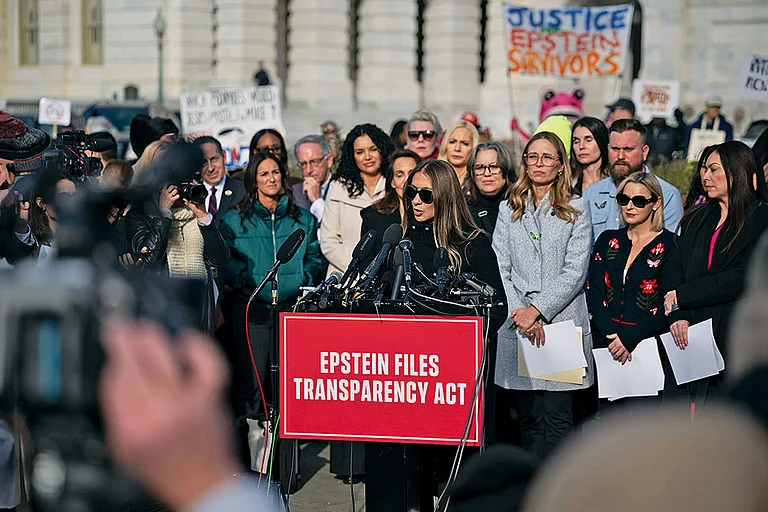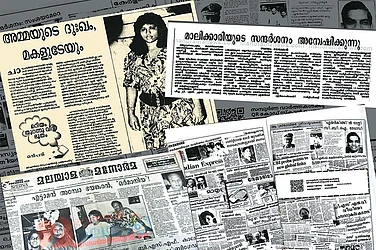The God Deal-Auction
Blessed be the Rolex prasad. One of the Swiss watchmaker’s luxury offerings sold for Rs 4 lakh at this year’s Lalbaugcha Raja auction in Mumbai. The auction has been held every year since 1985 to raise money for various educational facilities run by the Lalbaugcha Raja Ganeshotsav Mandal, by selling off items offered up by devotees during the preceding 10-day festival. The mandal received 5.5 kg of gold, 75 kg of silver and Rs 6.5 crore in cash this year, with the auction then bringing the total up to about Rs 7.5 crore—a far cry from the record of Rs 11.5 crore set in 2008, the mandal’s 75th anniversary. Other notable items that went under the hammer include a 1.2-kg golden idol of Ganesha that sold for Rs 35.7 lakh and a gold bar that fetched Rs 31.2 lakh.

YHWH’s Own Country
From Canaan to Cannanore they come, seeking shirts. Maryan Apparel, a tailoring outfit based at a state-run industrial park in Kerala’s Kannur district, has supplied the Israeli police with their uniform shirts for the past three years. Launched in 2006 and owned by businessman Thomas Olickal, it’s an operation with hundreds of tailors, and they’ve been sending almost one lakh shirts annually to the Promised Land. The tailors design and attach the force’s emblems to the sleeves in addition to stitching the light blue, long-sleeved, double-pocket shirts. The company used to make the uniform’s bottom half, but a Chinese firm ‘bagged’ the contract recently; talks to re-bag the said trousers are ongoing. Other clients include Kuwait’s fire service and national guard.

Evicted Erection
A wall is being hounded out of its home and forced to relocate. The culprit is none other than the Aamir Khan-starrer 3 Idiots. In the film, a character tries to urinate on a wall (the ‘Rancho Wall’) at a school in Shey, Ladakh, only to be electrocuted by a mechanism devised by the pupils. The wall quickly shot to fame, becoming an attraction for tourists who wanted to take pictures there, and the Druk Padma Karpo School decided to have it painted. But now, with the place being flooded with tourists, the pupils being distracted and the campus reportedly “being reduced to a litter ground”, according to principal Stanzin Kunzang, the school has finally decided to move the wall 200-300 metres away—a clarification to this effect was issued after dismaying initial reports that they were going to tear down this wall.

Mela-En-Scène
Baahubali does Kumbh Mela, on an immense scale, of course. Set designers of the blockbuster have been recruited to help create a Rs 300-crore, 15-acre museum on Indian culture called ‘Sanskriti Gram’—with an Ajanta-themed entrance and a three-hour ‘experiential tour’, covering history from Vedic times to the present—as part of an effort to make the January 2019 Ardh Kumbh at Allahabad “the biggest of its kind”. The Union culture ministry-led push comes nine months after the Kumbh Mela was accorded a place on UNESCO’s Intangible Cultural Heritage of Humanity list as the largest peaceful congregation of pilgrims. It will also feature performances by hundreds of artistes and an international ballet themed around the Ganga.

Bare Bum Chums
It’s one of those trends; after all, what power can check a perky pair of cheeks determined to be photographed? Mountain peaks are a popular site for people to snap a picture of themselves with their bums exposed to the bemused elements. When an intrepid band of young men posed for such a picture on Sri Lanka’s sacred Pidurangala Rock, a Buddhist monk registered a complaint, and the police arrested three of the cheeky chappies. Reactions have been mixed, with some noting that only Lankan men had been arrested—foreigners have posted similar photos on Instagram with no consequences.
Professor Faces Pique Charges
The internet, by law, is a safe space for Bangladesh Prime Minister Sheikh Hasina. A university lecturer has been suspended and jailed for making derogatory remarks about her on Facebook. Maidul Islam of Chittagong University posted the comments during last month’s anti-government protests over road safety. An activist, reportedly of the Chhatra League, the student arm of the governing Awami League, filed a case under the country’s Information and Communication Technology Act. Left-wing groups are said to be organising protests in response to Maidul’s arrest.
The Hopeful Floodgates
The Ottoman Empire once raised funds for two battleships through public subscription, only for the pair to be seized by the British—who were building the ships—at the outbreak of the Great War. Pakistan PM Imran Khan is hoping to go one step further by raising $14 billion through crowdfunding to build dams in what is being described as the largest such effort in history, with the target being 700 times the current Kickstarter record. “We have only 30 days’ water storage capacity,” said Imran in an appeal that has had reasonable success thus far, but hasn’t collected anything close to the sum needed. Critics are, as ever, unimpressed, calling the crowdfunding plan infeasible.

Thy Kingdom Come
The strategic space for Pakistan to strike a balance between Saudi Arabia and Iran is shrinking fast. The looming economic crisis that the country stares at has made the current task even more difficult. Riyadh is being seen as one of the possible sources by Islamabad’s policy planners to bail Pakistan out of the potential crisis. But it may come with the promise for a closer military cooperation between the two.
Newly-elected prime minister Imran Khan had to bend his promise of not undertaking any foreign travels in the first four months of his office with a recent visit to Riyadh. If Imran chose Saudi Arabia as his first choice for foreign travel, major players in the kingdom also laid out the red carpet to receive him. Much of the talks between the two sides centred on economic matters—possible Saudi investments in Pakistan and the extent to which Riyadh was willing to help Islamabad in overcoming its spiralling financial woes.
Pakistan needs over $12 billion to tide over its economic crisis. Though the International Monetary Fund (IMF) had been the main source to bail out the country on similar occasions in the past, the new Pakistani government is reluctant to knock on its door. Part of this could stem from its attempt to maintain an independent line vis-a-vis the United States, which is a major stakeholder in the IMF.
The US-China antagonism, reflected in the rising temperature of the ongoing trade conflict, may also be a major reason for Pakistan not reaching out to the IMF for help. China is one of Pakistan’s biggest backers. But the Imran Khan government has already announced a slew of measures to cut down expenses and the country’s budget, including some projects in the China-Pakistan Economic Corridor (CPEC).
Saudis have also been among the other backers of Pakistan. But in the past few years bilateral relations have been strained when the Nawaz Sharif government refused to send troops to fight the Saudi-led coalition’s war in Yemen against the Iran-backed Houthis.
Imran’s recent journey to the kingdom signalled attempts at removing those strains from bilateral ties. But, if the Saudis agree to a major bail-out, it will also expect Pakistan to cooperate in tackling threats to Riyadh. The biggest of which now comes from Iran, a country that is Pakistan’s neighbour and with which Islamabad is unwilling to open a new front of confrontation at this juncture.
But how long will they be able to avoid it?
Illustrations by Sajith Kumar


























